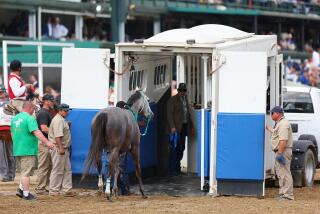Dying to ride
- Share via
In 2005, jockey Emanuel Sanchez collapsed at Colonial Downs and later died, his body ravaged by the brutal dieting and dehydration endured by riders who must stay light to race. Months later, jockey James “Chris” Herrell died of similar causes, and an angry spotlight was shined on the “sport of kings.” People for the Ethical Treatment of People railed against the conditions for jockeys -- the inhumane weight requirements, the lack of health insurance, the lousy pay.
Come on, you remember the furor. No? Well, that’s because there wasn’t one. But there would have been if Sanchez and Herrell had been horses. Witness how the sport has been reeling since Eight Belles’ fatal breakdown at the Kentucky Derby. Her tragedy resurrected the angst over Barbaro, who was eventually put down after his 2006 Preakness injury, and George Washington, who was euthanized last year at the Breeders’ Cup Classic.
Maybe jockeys don’t excite compassion because they aren’t very pretty. After two fashion models died of complications from anorexia in 2006, designers and magazine editors were excoriated for promoting ambulatory skeletons on the runway. Yet jockeys are expected to starve themselves and be top athletes. In an interview with The Times four years ago, jockey Kent Desormeaux, who with Big Brown will race for the Triple Crown next week, spoke of the struggle to stay light: “The reality is that probably 85% of riders are dying to ride -- literally.” If the stresses of the job aren’t enough, there’s the fact that many can’t afford health insurance on pay that’s as low as $27 a day.
Although the sport has made only incremental progress in the treatment of jockeys, California is far ahead of the rest of the country. Here, about $1 million a year in unclaimed gambling winnings goes to a fund that helps defray the cost of health insurance. In addition, proceeds from Internet gambling help fund the nation’s only pension plan for jockeys. And California is one of a handful of states where jockeys are covered by workers’ compensation.
That leaves the weight issue. The ridiculously low weight requirements for jockeys were largely determined in the 1850s, when most riders were slaves and, due to malnutrition, were smaller than the average American. Today, most male jockeys can only maintain a weight of about 110 pounds by dangerously dehydrating themselves.
As racing gears up for its next big event, officials should recognize that the sport won’t be ready for the 21st century until its policies encompass the welfare of all its athletes, human as well as equine.
More to Read
Go beyond the scoreboard
Get the latest on L.A.'s teams in the daily Sports Report newsletter.
You may occasionally receive promotional content from the Los Angeles Times.










